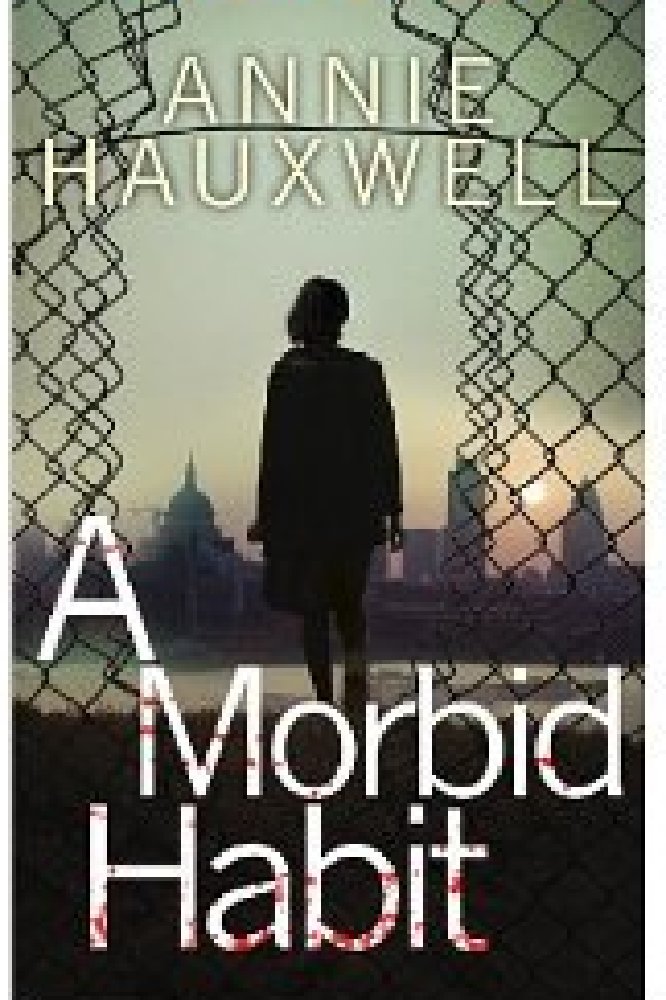
A Morbid Habit
A Morbid Habit is a tale of murder, mayhem and Advent Calendars, which opens on a bleak industrial site in London just before Christmas. Catherine Berlin, a financial investigator, is broke, struggling with a drug habit and dreading the thought of Christmas lunch with her mother. She gets lucky with a job in Moscow but as soon as she arrives, her luck deserts her: her target is dead, her passport is confiscated and her interpreter is not what she seems. Then things really go pear-shaped when she’s pursued through the dark underbelly of Moscow by the Russian police and betrayed by the British government. It all ends under six feet of snow somewhere near the Latvian border.
Please tell us about the character of Catherine Berlin.
Berlin would probably be best described as ‘a handful’. She’s a woman of a certain age who has had a long love affair with heroin, but manages to stay on the right side of the law most of the time. She takes on dubious cases because she’s bored, needs the money or can’t ignore injustice. She’s got a soft spot for the ‘undeserving poor’, a sharp tongue for fools and a wicked sense of humour. Born and bred in Bethnal Green, Berlin is deeply attached to London, Scotch and a full English breakfast. She gets embroiled in lost causes and very occasionally saves the day.
Did you visit Russia to gain a feel for the place before writing the book?
The first time I went to Moscow I really didn’t like it; let’s be honest, I hated it. But after I decided to send Berlin there, I went back a couple of times to make sure I could do justice to the weather, the architecture and, of course, the atmosphere, at least from my perspective (or I should say, from Berlin’s). I actually spent Christmas and New Year there, which is when the action in the book takes place. Russian Christmas starts a week after ours, so it was quite surreal; arriving in Moscow at five o’clock in the morning on what was Christmas Day in London. New Year’s Eve in Red Square was amazing.
Why did you decide to take the book there?
It was largely because during my first trip I found it threatening and sinister and the people drunk and hostile. Perfect for a crime novel! It got worse; actually, as on the way home to London I was frog-marched off the train by the Belarussian police because I didn’t have a visa. I didn’t even know I was in Belarus: the train was just passing through overnight. It was quite a trip. I was determined to go back and try to get a handle on Moscow. I learnt some Russian, did a bit of homework and now I love the place and can’t wait to go again, notwithstanding the challenging politics (putting it nicely).
How did you feel when you found out In Her Blood was being made into a TV show?
Amazed. Delighted. Horrified. I’ve written a number of screenplays and know the film and TV industry, so I knew it meant I would have to ‘let go’ of Berlin. It’s not easy, but if you accept that the adaptation is going to reflect the scriptwriter’s vision of your book, not to mention the input of the director, the producers, and the actors, it can be a really interesting experience. Of course, it’s very flattering that someone thinks your work will make a good telly. It won’t hurt my mortgage, either.
You are also an investigator so how do you juggle this with your writing?
I juggle poorly, so now I’m down to about ten per cent investigating and ninety per cent writing. I really enjoy getting out into the ‘real’ world, so I miss it, but I’m conscious that I could end up not doing anything properly if I don’t focus. Investigations take a lot longer than those in novels and on TV, and they’re unpredictable, so it’s difficult to manage your time effectively when you’re trying to do both things. Plus, I’m lazy.
What attracted you to Australia where you spend your time when you are not in London?
My family emigrated to Australia when I was a teenager and, as with Moscow, at first I hated it. I think adolescence is tough enough, without trying to fit in somewhere new. I returned to London as soon as I was old enough (and had the money), and discovered I was Australian! Ever since, I’ve divided my time between the two places. I feel very connected with London and love being there, but it’s a very demanding city. It’s great to get back to the little country town where I live in Australia, with fresh air, kangaroos just over the back fence (no, really) and, of course, Australian Rules Football, the best game in the world.
You have written short crime fiction too, so do you have a preference between the two?
Short fiction is too tough for me, I’m far too gabby. The novel is such a flexible beast, you can try and tame it any way you like. But short stories require enormous discipline and an absolute willingness to sacrifice that perfect sentence for which there really is no place in your tale. I’d be sobbing in my porridge.
What is next for you?
I’m working on the fourth book in the Berlin series, House of Bones. It’s set in London but has a strong ‘back story’ in the Opium Wars. It’s given me the perfect excuse to travel to China. Recently I went to Guangdong to visit the Opium Wars Museum and I’m hoping to go again. But next week I’m doing a corporate misconduct investigation in a regional hospital; not quite as exotic, but no doubt it will turn out to be almost as bloody.

